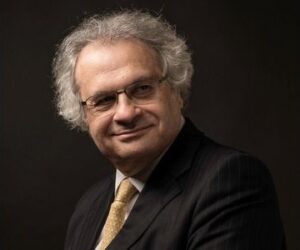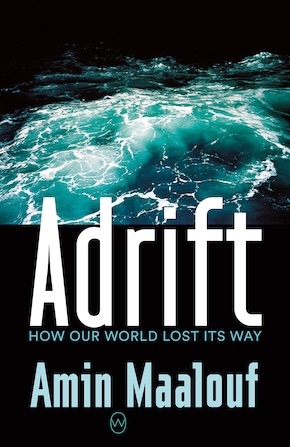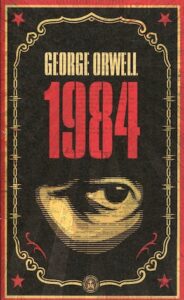Big brothers
by Amin MaaloufSince my teenage years, I have been fascinated by the works of Orwell, while casting a critical and selective eye over them. I have always considered that his great masterpiece is Animal Farm; I was always less engaged by 1984. The idea behind 1984 was undeniably powerful; but, as so often with novels that expound a social or political thesis, the novel is somewhat overshadowed by the thesis.
Moreover, when I first began to pay attention to world events, Stalin was dead, his body had been removed from the mausoleum in Red Square, and Stalingrad had been renamed; the threat of Stalinism that the novel warned against no longer seemed plausible, and its message of alarm appeared unwarranted.
I made my peace with 1984 the day I realized that the most important thing in a literary work is not the message the author is trying to convey, but the intellectual and emotional sustenance each reader can draw from it. When I re-read the novel as an adult, I became keenly aware that all human societies, however developed, ran the risk of being caught up in a system that would challenge everything that they had built.
Granted, the form that this threat takes today is not the one that Orwell feared. His imagination was conditioned by the era in which he lived; having observed the totalitarian regimes of his age, he believed he knew where future tyrannies would come from, the ideologies that would govern them, and the methods they would use to survive. If, in this, he was mistaken, in the main he was nonetheless correct. Because, beyond his hatred of dictatorships, whether left- or right-wing, he had a more fundamental fear, that of seeing science perverted, ideals warped, and human beings enslaved by the very things that were supposed to free them.
It is this dread that comes through in his writings. A dread that is as justified today as it was then, sadly. Not because of the totalitarian nightmare that obsessed him, but because of a different nightmare, one that would doubtless have horrified him had he imagined it.
A frightened world in which constant surveillance of our every action is dictated by a real and legitimate need to feel protected at every moment, is ultimately more disturbing than a world where surveillance is imposed by a paranoid and authoritarian regime.
In Orwell’s mind, the name “Big Brother” was bitterly ironic, like the nickname sometimes given to Stalin, “The Father of Nations.” To characterise the relationship between oppressor and victim as “brotherly” or “fatherly” requires a twisted worldview. Yet those of us living in the twenty-first century do not think of the electronic eyes that follow us everywhere as hostile.
Faced with the twisted world around us, we increasingly feel the need to know that we are safe. As a result, we do not see those responsible for this surveillance as oppressors, but as genuine “big brothers.” By and large, the electronic eyes following us have no sinister purpose; their intrusions into our private world usually result from a drift that is trailing technologies and people in its wake.
It is only when we become aware of some outrageous invasion of our own privacy that we begin to balk and become indignant. But our indignation is short-lived, and measured. As though our ability to react has been numbed.”
Such intrusions into my day-to-day life do not bother me particularly. On the whole, I have adapted to them, and can even sometimes see the benefits. I assume this is the same for most of my contemporaries. We are relieved when we hear that a criminal has been captured using CCTV footage, or that a corrupt leader has been brought down using information from his itemized phone bills.
It is only when we become aware of some outrageous invasion of our own privacy that we begin to balk and become indignant. But our indignation is short-lived, and measured. As though our ability to react has been numbed.
Were it not for the circumstances in which we live these days, these infringements on our freedom would provoke outrage. The idea that someone was listening to our calls, filming our comings and goings, would seem totally unacceptable; that in airports we are scanned and frisked and forced to remove our shoes and our belts would seem blatantly insulting; citizens’ rights groups would be campaigning to impose strict limits on such intrusions.
But this is not how we have reacted. Daring an analogy with biology, I would say that the world events of recent decades have had the effect of “blocking” us from “secreting antibodies.” We are less shocked than we should be by these infringements on our freedoms; we protest, though only feebly. We place our trust in the authorities protecting us; and if they go too far, we claim extenuating circumstances.
This dulling of our critical faculties is, in my view, a significant and very worrying development.
I have made reference to the system into which this century we have been dragged. Using the analogy of “antibodies,” we can more closely observe how the system works: the rise of identity-related tensions triggers legitimate fears, this causes us to seek security for ourselves and our loved ones at all costs, and to be feel vigilant whenever we feel threatened. As a result, we are less aware of the potential abuses that this heightened state of vigilance can lead to; less wary when technology infringes on our privacy; less vigilant when governments amend laws in ways that are more peremptory and authoritarian; less alert to the risks of Orwellian drift…
In every generation, a balance must be struck between protecting people, on one hand, from those who exploit democracy in order to promote policies that erode personal freedoms, and, on the other hand, protecting them from those who, on the pretext of protecting democracy, seek to weaken it. As things stand, I feel that, despite certain discrepancies, this balance has been maintained, though the future looks much less reassuring. We are caught in a process that is infantilizing and potentially enslaving, one that will prove difficult to curb; new technological advances will further increase government’s ability to intrude on its citizens, and the threats they use to justify such intrusions are not going to disappear. Some see this as an insidious process, one that, if not totalitarian, is manipulative and authoritarian at best; personally, I see it as the sad but inevitable result of the demons of identity politics unleashed on the world, that we have been unable to tame.
This calamitous dynamic could get worse and go beyond that which we can imagine today. I cannot bring myself to imagine how our contemporaries would react if our cities were to suffer massive attacks involving biological, chemical, or nuclear weapons.
I hope we can avoid such catastrophes, but sadly it is not unreasonable to think that they might occur, and, if so, their impact on our societies would be devastating.
There is a very real fear that our descendants will increasingly listen to those voices that say it is better to live in a heavily guarded fortress with high walls, even if that means sacrificing certain freedoms and values.”
Even if it were possible to indefinitely delay such atrocities, the drift would continue. In recent opinion polls, whether in Europe, the United States, or elsewhere, we have seen that voters are more likely to listen to those voices who insist that we have to protect ourselves by any means necessary, than to those who warn against our obsession with security and our excessive use of force. The results of these polls are understandable in a world where people fear that they may be a target, where they feel vulnerable; what remains to be seen is how far we can go in our need to feel safe without undermining other, equally legitimate, freedoms.
We have only to look around us to realize that the way of the world is unlikely to allay these fears.
In all honesty, I cannot think of a single scenario in which this trend might be reversed. Every indication suggests that it will continue, sometimes more slowly, sometimes more quickly, but always tending in the same direction: a steady increase of fear.
What will our countries look like in twenty years, in fifty years? I wish I could say that I believe these shifts in our political and intellectual landscape will prove ephemeral, that our concerns over terrorism or migration will be temporary, that our societies will come through these ordeals more generous, more tolerant, more magnanimous. But that is not what is looming on the horizon. There is a very real fear that our contemporaries and their descendants will increasingly listen to those voices that say it is better to live in a heavily guarded fortress with high walls, even if that means sacrificing certain freedoms and values.
“The choice for mankind lies between freedom and happiness, and for the great bulk of mankind, happiness is better,” Orwell has one of his characters say cynically in 1984. No one else is likely to present the situation to us quite as bluntly; but in the century in which we find ourselves, this dilemma no longer sounds completely outrageous.
From Adrift: How Our World Lost Its Way (World Editions, £12.99)
 Amin Maalouf was born in Beirut. He studied economics and sociology and then worked as an international reporter until the Lebanese Civil War broke out in 1975. Maalouf and his family settled in Paris in 1976, where he became editor in chief for the newspaper Jeune Afrique. He published his first book, The Crusades Through Arab Eyes, in 1983. In 1993, The Rock of Tanios, his fifth novel, won the Prix Goncourt. Maalouf is a member of the Académie Française and in 2010 was awarded the Prince of Asturias Award for Literature for his entire oeuvre. His work has been translated into fifty languages. Adrift, translated by Frank Wynne, is published in paperback and eBook by World Editions.
Amin Maalouf was born in Beirut. He studied economics and sociology and then worked as an international reporter until the Lebanese Civil War broke out in 1975. Maalouf and his family settled in Paris in 1976, where he became editor in chief for the newspaper Jeune Afrique. He published his first book, The Crusades Through Arab Eyes, in 1983. In 1993, The Rock of Tanios, his fifth novel, won the Prix Goncourt. Maalouf is a member of the Académie Française and in 2010 was awarded the Prince of Asturias Award for Literature for his entire oeuvre. His work has been translated into fifty languages. Adrift, translated by Frank Wynne, is published in paperback and eBook by World Editions.
Read more
@WorldEdBooks
Author portrait © JF Paga/Grasset
Frank Wynne is a literary translator and writer. Born in Ireland, he moved to France in 1984 where he discovered a passion for language. He began translating literature in the late 1990s, and in 2001 decided to devote himself to this full-time. He has translated works by Michel Houellebecq, Ahmadou Kourouma, Boualem Sansal, Claude Lanzmann, Pierre Lemaitre, Tómas Eloy Martínez, Patrick Modiano and Almudena Grandes. His work has earned him awards including the Scott Moncrieff Prize and the Premio Valle Inclán. His translation of Vernon Subutex by Virginie Despentes was shortlisted for the Man Booker International 2018.
terribleman.com
@Terribleman



